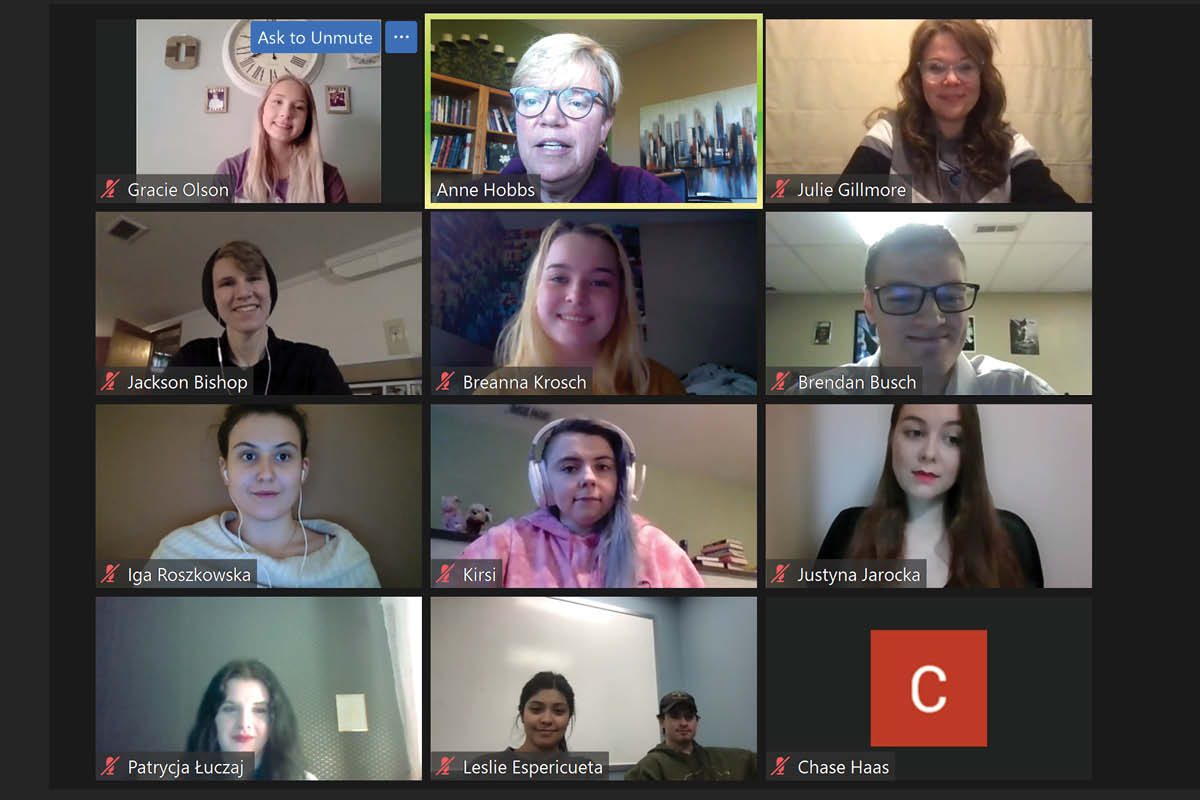UNO Students Share Solutions to International Issues
An international criminal justice class, taught by UNO's Anne Hobbs, J.D., Ph.D., tackles current affairs with final project.
- published: 2022/01/29
- contact: Rachel Hobbs - Juvenile Justice Institute
- email: ahobbs@unomaha.edu
- search keywords:
- UNO
- Criminal Justice
- CPACS
- International
- Current Affairs

Earlier this month, UNO students wrapped up final projects in the first International Criminal Justice service learning course taught by Anne Hobbs, J.D., Ph.D., Director of the Juvenile Justice Institute within the UNO School of Criminology and Criminal Justice.
Over the course of the semester, the class covered a wide range of issues, including the American pull-out of Afghanistan, the abuse of the Uyghur population in China, and the crisis at the Poland-Belarus border. For their final projects, students pitched grant proposals, describing actions they could take to create positive and lasting changes in the world.
UNO students partnered with a class from the University of Bialystok in Poland to share ideas about international issues. The discussions were timely and relevant, but also hit close to home for the UNO students and Bialystok students alike. Half of the Bialystok students were Polish and half were Belarusian. The University of Bialystok is less than 30 miles from the Belarusian border.
Many of the European students had personal ties to the crisis. Some had family members at the border, while others said they wanted to keep their country safe and secure the border, Hobbs said. The American students facilitated a discussion between those from Poland and those from Belarus, and served as mediators in a Zoom classroom in real time. The UNO students drew upon similar issues at the U.S.-Mexico border to discuss potential solutions with people on both sides of the issue.
In exit surveys, the Bialystok students expressed that they were glad they had been allowed to communicate freely and honestly about their viewpoints.
“I am very grateful that I was able to participate in this project,” one student said. “I like the opportunity to exchange views on international issues also in the field of politics. I met many fantastic people and deepened my knowledge about the United States.”
In the final weeks of the course, students were called to create their own humanitarian solutions and write a grant to target one of four issues: child soldiers, the abuse of the Uyghur population, women’s education under the Taliban regime, and the Rwandan genocide.
One group proposed partnering with Journalism and English students to write and illustrate children’s books about the devastating problems facing child soldiers. These books could then be sent to African countries with volunteers who could read them to at-risk children.
Another group developed remote learning opportunities for women in Afghanistan.
“Kind of like what we all learned through Covid–education can be done remotely,” Hobbs said. Students were working out how it could be possible to put an iPad in every woman’s hands in Afghanistan, because you can’t prevent them from learning if they have access to the internet.
The biggest issue for that proposal was logistics, she said.
“Was there a way they could do that without being discovered? How do you keep [women] safe from the Taliban? How do you keep the Taliban from blocking the internet? These are not perfect solutions,” Hobbs said, “but students came up with really good stuff.”
The most important lesson she wanted students to take away from the course was the inspiration to act.
“We can’t sit back and let the international criminal court–or somebody else–achieve peace… Sometimes we look to something like the international criminal court and we think they can solve the world’s problems, and they can’t because there’s too many dictators, there’s too much chaos going on.” Hobbs said. “We can’t just let somebody else do the work. We need to do the work. Each of us has to do that. Right where we are at, right now.”
“This course really opened my eyes to our world’s justice system… even though it has its best intentions, there is still so much just outside of their power,” one UNO student said. “I appreciate all that [Dr. Hobbs has] done to make this a unique learning experience.”
Beyond the classroom, Hobbs encouraged her students to find ways to actively engage in international affairs, and introduced them to programs they can apply to through the United Nations, NATO, Fulbright, and the International Criminal Court in The Hague.
Instead of just reading about these issues in the news, Hobbs hopes her students will continue to remain involved and aware of international affairs, just as they did in class.
“It was probably the best class I ever taught,” she said. “It was a perfect class.”